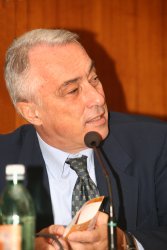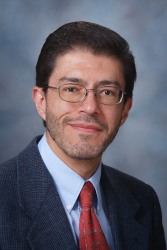Personal Profiles
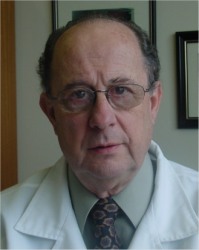 Ricardo Pasquini
Ricardo Pasquini
Universidade Federal do Paraná
Curitiba, Brazil
Ricardo Pasquini is an Emeritus Professor of Internal Medicine, Hematology and Oncology and former Head of the Division of Hematology and Medical Oncology at Hospital de Clínicas of Federal University of Paraná in Curitiba, Brazil and also Head of Bone Marrow Transplant Center at the same Institution for almost 30 years.
He pioneered hematopoietic stem cell transplant in Latin America, doing the first transplant in 1979 and more than 1800 procedures, mainly allogeneic, were performed. The major experience in stem cell transplant concentrated in CML and acquired and constitutional Aplastic Anemias patients. Following the advent of TKIs inhibitors (year 2000), he organized and coordinated a CML outpatient clinic where approximately 400 patients have been registered and some enrolled in several protocols. Also, a laboratory for BCR/ABL quantification and mutation detection was settled that receive samples from several Brazilian Centers.
He has been interested in treatment optimization of chronic myelogenous leukemia (CML) and has been involved in the management of the randomized CML Studies I-IV of the German CML Study Group for more than 19 years. His special interests are the molecular monitoring of minimal residual disease and mechanisms of resistance in CML, and targeted therapy in a variety of neoplastic disorders.
Dr. Pasquini is investigator for the nilotinib, dasatinib and bosutinib phase II and phase III studies, has been participating in imatinib phase II and III studies and is a member of World CML Advisory Committee.
He is a member of the American Society of Hematology (member of the International members Committee for nine years), the European Hematology Association, the American Society of Clinical Oncology, the International Society of Experimental Hematology, the American Society of Blood and Marrow transplant and for many years member of the Executive and Advisory Committee o IBMTR/CIBMTR. He is a member of the Brazilian Hematology Association and founder member of the Brazilian Bone Marrow Transplant Society. He has published over 100 peer-reviewed papers and is regularly invited to speak at national and international symposia.
 Prof. Dr. Jiri Mayer
Prof. Dr. Jiri Mayer
Prof. Dr. Jiri Mayer (jmayer@fnbrno.cz), is Deputy Head of the Dept. of Internal Medicine, Hematology and Oncology, University Hospital Brno, Brno, Czech Republic, and now also the Dean of the Medical Faculty, Masaryk University Brno, Czech Republic.
He graduated in 1985 at Brno. After training in general internal medicine during 1985-1990, he started to work at the specialized hematology dept., where he has been working up to now. His certified qualifications are internal medicine, hematology, and oncology. Since 2001, he has been a Professor at the Medical School, Masaryk´s University, Brno, Czech Republic. His scientific experience comprises:
- Internal medicine, intensive care medicine
- Hemorheology
- Supportive care in hematology/oncology, especially diagnostics and treatment of infection in immunocompromissed patients
- Autologous and allogeneic bone marrow transplantation
- Peripheral blood stem cell transplantation
- Adult stem cell therapy
- Diagnostic and therapy of lymphomas and leukemias (especially CML)
In 1990, he visited Cancer Research Institute in Berlin, Germany, and in 1996, Royal Marsden Hospital, Leukaemia/Myeloma Unit, London, UK.
He is a member of European Group for Blood and Marrow Transplantation, American Society of Hematology, International Society for Experimental Hematology, European Haematology Association, and American Society for Blood and Marrow Transplantation.
He is also founding member and now chairman of the CzEch Leukemia Study Group for Life, CELL (http://leukemia-cell.org).
He has been the principal investigator of many trials since 1995, in the fields of lymphomas and leukemias. He has published more than 300 papers, abstracts, and lectures.
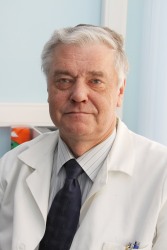 Andrey Zaritskey
Andrey Zaritskey
Saint-Petersburg, Russia
Andrey Zaritskey is Professor of hematology, Director of Institute of Oncohematology of Federal center of Heart, Blood and Endocrinology and lecture of Saint-Petersburg Pavlov state Medical University. He was graduated and post-graduated in Saint-Petersburg Pavlov State Medical University during 1967-1978 years. He has published more than 197 articles/abstracts in national and international journals. His scientific interest is the study of chronic myeloid leukemia and chronic lymphoproliferative neoplasms (chronic lymphocytic leukemia and Non-Hodgkin lymphomas), mesenchymal cell-haematopoietic cell interactions. He has been participating in nilotinib, dasatinib and bosutinib phase II and III international studies. He is one of the leaders in chronic myeloid and lymphatic leukemia in Russia, and deputy-chair of the scientific board of Russian Experts in chronic
myeloid leukemia.
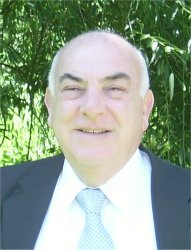 Dr Eduardo Bullorsky
Dr Eduardo Bullorsky
Dr Eduardo Bullorsky graduated at the University of Buenos Aires Medical School in December 1972.
In the period 1973-1976 he completed a Residence on Internal Medicine at the Instituto de Investigaciones Medicas, University of Buenos Aires, with Prof. A. Lanari. In the same Institution he completed a training in Hematology-Oncology in the period 1976-1981 with Dr J. Sanchez Avalos, and in 1981 was selected as a staff physician at the Hospital Britanico (British Hospital) of Buenos Aires, in the Department of Hematology.
In the year 1985, Dr Bullorsky performed a fellowship in the Department of Bone Marrow Transplantation at Hadassah Medical Center, Hebrew University of Jerusalem, Israel, under the direction of Prof. S. Slavin.
In the year 1986, Dr E. Bullorsky performed the first bone marrow transplantation in Argentina, being this the first step for the introduction of this therapeutic in the country.
In the year 1990, Dr Bullorsky was appointed as chief of the Department of Hematology, Blood banking and Bone Marrow Transplantation of the Hospital Britanico (British Hospital) in Buenos Aires, and in 1999 was elected for the period 1999-2001 as president of the Argentinian Society of Hematology.
Dr E. Bullorsky is a teaching professor at the University of Buenos Aires (UBA), and at the Universidad Catolica Argentina (UCA).
He is member of the American Society of Hematology (ASH) and CIBMTR among other Scientific Societies.
He authored or co-authored more than 200 papers, abstracts and presentations.
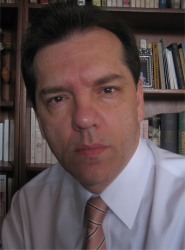 José Luis Lopez, MD
José Luis Lopez, MD
Caracas, Venezuela
Dr. Lopez is a Professor of Hematology and Internal Medicine at the "Universidad Central de Venezuela". Head of the Department of Hematology Clinics at the Banco Municipal de Sangre in Caracas, starting his work in this Institution in Hemato-Oncology Clinic at 1991 and developed the Molecular Dx Laboratory in 1992.
He occupied the Secretary position (2001-2003) at Venezuelan Society of Hematology and was a Founder Member of the National Transplant Organization of Venezuela.
Dr Lopez is an active member in the Investigation Department of his Medical Center and have been interested in Clinical Research and Molecular Genetic of Chronic Leukemias, collaborating like an Investigator Overseas in NCI-Cancer Therapy Evaluation Program (1995-1997).
- Born in Bologna 16.08.1942
- M.D. degree 1966, University of Bologna
- Postgraduate degree in Hematology, 1969, University of Modena
- Research fellow, Rigshospitalet, University of Copenhagen, 1970
- Fellow, resident and senior resident at the Institute of Hematology "L. and A. Seràgnoli", S. Orsola University Hospital, Bologna, 1971-1980
- Professor of Cancer Chemotherapy, University of Chieti, 1980
- Professor of Hematology, University of Trieste, 1981-1986
- Professor of Hematology, University of Udine, from 1987 to 2000
- "Head, Division of Hematology and Bone Marrow Transplantation, Udine University Hospital, from 1989 to 2000
- Professor of Hematology, University of Bologna, from 2000
- Head, Institute of Hematology and Medical Oncology "L. and A. Seràgnoli", S.Orsola University Hospital, Bologna, from 2000 to 2007, and Department of Hematology and Oncology "L. and A. Seràgnoli" from 2008 .
- President, Italian Society of Experimental Hematology, 1994-1995
- President, Italian Society of Hematology, 2002-2003
- Chairman, GIMEMA CML Working Party (formerly Italian Coop. Study Group on Chronic Myeloid Leukemia), from 1989
- Member, Working Package 4 Chronic Myeloid Leukemia, European LeukemiaNet
- Vice-Dean, Faculty of Medicine and Surgery, University of Bologna, from 2001 to 2007
- Clinical interest: chronic myeloid leukemia, acute leukemia, chemotherapy, stem cell transplantation
- Research interest: cell kinetics, stem cells, multidrug resistance, molecular pathogenesis of leukemia
Professor of Medicine
Chief, CML Section
Department of Leukemia
The University of Texas MD Anderson Cancer Center
Houston, Texas
Jorge Cortes, MD, is deputy chair and professor of medicine in the Department of Leukemia at The University of Texas MD Anderson Cancer Center, Houston Texas where he directs the CML Program. Dr. Cortes received his medical degree in 1986 from the Universidad Nacional Autonoma de Mexico, Mexico City, and has been at MD Anderson Cancer Center since 1991. Dr. Cortes, whose clinical interest focus on new drug development and the management of patients with myelodysplastic syndromes, acute and chronic leukemias, and myeloproliferative disorders has authored over 400 peer-reviewed medical publications. He has received numerous awards including the Faculty Scholar Award from MD Anderson Cancer Center in 2003, the Annual Celgene Young Investigator Achievement Award for Clinical Research in Hematology in 2005, The Dr. John J. Kenny Award from The Leukemia & Lymphoma Society in 2006, the Service to Mankind Award from The Leukemia & Lymphoma Society in 2007, and the Otis W. and Pearl L. Walters Faculty Achievement Award in Clinical Research from MD Anderson Cancer Center in 2007. Dr. Cortes is chief editor of Current Hematological Malignancies Reports and Clinical Leukemia and serves in the Editorial Board of the Journal of Clinical Oncology, Leukemia, Clinical Cancer Research, Leukemia and Lymphoma and the American Journal of Hematology.
Francisco Cervantes
Francisco Cervantes is senior consultant at the Hematology Department of the Hospital Clínic, in Barcelona, Spain, and associate professor at the University of Barcelona. His main scientific interest is the study of chronic myeloid leukemia (CML) and the Ph-negative chronic myeloproliferative neoplasms (MPNs), mainly their natural history, prognosis, biology, and treatment. As a result of the activity in this field, he has published more than 190 articles in peer-review international journals, including the New England Journal of Medicine, Blood, Journal of Clinical Oncology, Leukemia, British Journal of Haematology, Experimental Hematology, Haematologica, Cancer, Oncogene, Seminars in Oncology, and the European Journal of Haematology. In the CML field,Dr. Cervantes contributed to the elaboration of Sokal’s score, is a coauthor of the publications of the IRIS study, which established imatinib as first-line treatment for CML, has participated in the introduction of the second-generation tyrosine kinase inhibitors for patients resistant to imatinib, as well as in the authorship of the European LeukemiaNet recommendations for the treatment of CML. His more recent contributions in the field of the MPNs have been the elaboration of the new prognostic classification of primary myelofibrosis on behalf of the International Working Group for Myelofibrosis Research and Treatment, as well as several studies on the role of leukocyte and platelet activation in the thrombosis of MPN patients. At local level, he is the national coordinator of the CML studies within the collaborative PETHEMA Spanish group. Dr Cervantes is a member of the American Society of Hematology, the European Hematology Association, the International Working Group for Myeloproliferative Neoplasms Research and Treatment, the European Leukemianet, and the Spanish Society of Hematology.

